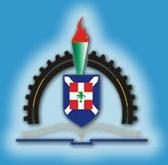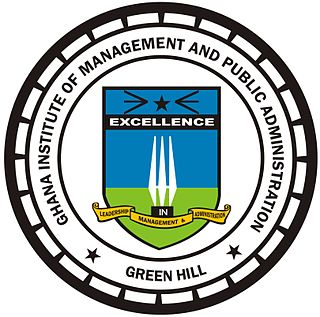
The University of Cape Coast (UCC) is a public collegiate university located in the historic town of Cape Coast in the central region of Ghana. The campus has a rare seafront and sits on a hill overlooking the Atlantic Ocean. It operates on two campuses: the Southern Campus and the Northern Campus. Two of the most important historical sites in Ghana, Elmina and Cape Coast Castle, are a few kilometers away from its campus.

Kwame Nkrumah University of Science and Technology (KNUST), commonly known as UST, Tech or Kwame Tech, is a public university located in Kumasi, Ghana. The university focuses on science and technology. It is the first public university established in the country, as well as the largest university in the Ashanti Region of Ghana.
Auckland Law School is one of the eight faculties that make up the University of Auckland. The Faculty of Law is located at the City Campus, between Waterloo Quadrant and Eden Crescent. It is in close proximity to the Auckland High Court. In 2020, Auckland Law School ranked 50th in the world and best in New Zealand according to QS World University Rankings. The University of Auckland's Faculty of Law is the largest of its kind in New Zealand. It advertises experts in a variety of fields, including commercial, public, human rights and environmental law.

The City Law School is one of the five schools of City, University of London. In 2001, the Inns of Court School of Law became part of City, and is now known as the City Law School. Until 1997, the ICSL had a monopoly on the provision of the Bar Vocational Course, the obligatory professional training for would-be barristers in England and Wales, before they commence pupillage.

The University of Mines and Technology (UMaT) is a public university located at Tarkwa in the Western Region of Ghana.

The Presbyterian University, Ghana is a partially private & public university with multi- campuses and its headquarters located at Abetifi-Kwahu in the Eastern Region of Ghana. It is one of the new universities in Ghana granted accreditation by the Ghana Tertiary Education Commission – GTEC. It was established by the Presbyterian Church of Ghana (PCG) on 23 November 2003 and inaugurated on 27 March 2004 by the president of Ghana in that republic, John Agyekum Kufuor.

Vodafone Ghana, formerly Ghana Telecom, is the national telecommunications company of Ghana.
The College of Agriculture and Renewable Natural Resources (CANR) is one of the six colleges of Kwame Nkrumah University of Science and Technology in Ghana.
The College of Engineering is one of the six colleges of the Kwame Nkrumah University of Science and Technology, in Kumasi, Ghana. It was established in October 1952 to prepare students for professional qualifications only. It has since grown and expanded and now as a college runs 15 BSc, 20 MSc, MPhil and PhD programmes under 3 faculties; the faculty of Electrical and Computer Engineering, the faculty of Civil and Geo Engineering and the faculty of Mechanical and Chemical Engineering and 10 academic departments.
The KNUST Department of Planning (DOP) is one of the academic departments at the Kwame Nkrumah University of Science and Technology in Kumasi, Ghana. It is under the KNUST College of Architecture and Planning. The department offers undergraduate and postgraduate programmes in the award of a degree. It is the only institution in Ghana professionally recognized by its government to train personnel to promote, coordinate and manage development at the national and sub-national levels.

Optometry is a relatively new field in eye care in Ghana.
The Department of Optometry at Kwame Nkrumah University of Science and Technology, is based in Kumasi, Ghana. Its placement is under the College of Science of the university. It is the smallest department of the college with 10 teaching staff and around 210 students
Esi Awuah is a Ghanaian academic and former vice chancellor of the University of Energy and Natural Resources in Sunyani, Ghana.

The Ministry for Chieftaincy and Traditional Affairs is the official Ghanaian agency responsible the creation of linkages between the Government of Ghana and the traditional authorities in the country. Based on recommendations by the African Peer Review Mechanism and the citizenry the Jerry John Rawlings administration established the ministry to address the recommendations. The Ministry was set up in 1993 and is backed by the Civil Service Law, 1993. Prior to its establishment, its functions were performed by two agencies namely the Chieftaincy Division Secretariat under the Office of the President and the Culture Division under the National Commission on Culture.

The Ghana Institute of Management and Public Administration (GIMPA) is a public co-educational university spread over four campuses and made up of six schools, ten research centers located at Greenhill in Accra, Ghana.

Helena R. Asamoah-Hassan is a Ghanaian librarian who is the present Executive Director of African Library and Information Associations and Institutions (AfLIA), the Board Chair for the Ghana Library Authority and the Secretary General of African Regional Memory of the World Committee
The SOAS School of Law is a law school of the University of London. It is based in the Paul Webley wing of the Senate House in Bloomsbury, London, United Kingdom. The SOAS School of Law has an emphasis on the legal systems of Asia, Africa and the Middle East.

Vivekanand Education Society's College of Law is a law school located in Sindhi Society Locality, Chembur, Mumbai. The school provides LLB, Five Year BLS LL.B as well as Certificate Courses in Human Rights, Intellectual Property Rights and Social Research Methodology programs.
Kwasi Obiri-Danso is a Ghanaian biological scientist and academic who served as 10th Vice Chancellor of Kwame Nkrumah University of Scicence and Technology.












